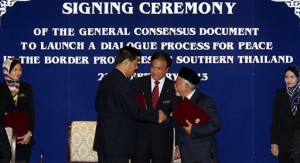
Thailand’s National Security Council Secretary general Paradorn Pattanathabutr, second from left, and Malaysian-based National Revolution Front chief Hassan Taib, second from right, shake hands after exchanging signed documents as Malaysia’s National Security Council Secretary Mohamed Thajudeen Abdul Wahab, center, witnesses during the signing ceremony of the general consensus document to launch a dialogue process for peace in the border provinces of southern Thailand, in Kuala Lumpur, Malaysia, Thursday, Feb. 28, 2013. Thai authorities and Muslim militant leaders based in neighboring Malaysia agreed Thursday to hold talks to help ease nearly a decade of unrest in southern Thailand. (AP Photo/Lai Seng Sin)
KUALA LUMPUR, Malaysia — Thai authorities and Muslim militant leaders based in neighboring Malaysia agreed Thursday to hold talks to help ease nearly a decade of unrest in southern Thailand.
Paradorn Pattanathabutr, secretary general of Thailand’s National Security Council, and Hassan Taib, a Malaysian-based senior representative of the militant National Revolution Front, signed the agreement aimed at starting the talks. No schedule was immediately given for future meetings, and the two sides did not elaborate about their plans.
“God-willing, we’ll do our best to solve the problem. We will tell our people to work together to solve the problem,” Hassan said after a brief signing ceremony in Kuala Lumpur ahead of a meeting later Thursday between Malaysian Prime Minister Najib Razak and his Thai counterpart, Yingluck Shinawatra.
Malaysian officials said details of the agreement would be made public after the two government leaders meet.
Violence has occurred nearly every day in Thailand’s three southernmost provinces since the insurgency erupted in 2004, and more than 5,000 people have been killed. Security forces as well as teachers have been targeted by insurgents because they are seen as representatives of the government of the Buddhist-dominated nation.
Muslims in the deep south, which was an independent Islamic sultanate until it was annexed by Thailand in the early 20th century, have long complained of discrimination by the central government in Bangkok, and the insurgents are thought to be fighting for autonomy. But the insurgency remains murky, with militants making no public pronouncements on their goals.
The insurgency is believed to be highly decentralized, with local units having the freedom to choose targets and campaigns.
Malaysia, whose northern states border Thailand’s south, is acting as a facilitator to bring some of the insurgents to peace talks, but it remains unclear who the actual leaders of the insurgency are.
In addition to the National Revolution Front, also known as Barisan Revolusi Nasional Melayu Pattani, another militant group, the Pattani United Liberation Organization, has made public calls for a separate state.
Paradorn said earlier this week fewer than 1,000 insurgents are living on the Malaysian side of the border.